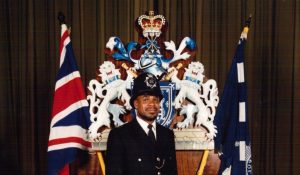Film Review: Guardian Documentaries presents… ‘The Black Cop’
‘I joined because I wanted to be white’.
This is the provocative opening line of Cherish Oteka’s Bafta-Award nominated short documentary, The Black Cop: An Officer Atones his Past.
These candid words are uttered by Gamal Turawa, or simply ‘G’ as he was known during his service with the London Metropolitan Police. The nickname functions as an alter-ego of sorts; representative of Turawa before his cultural (re)awakening.
The film starts as it means to continue. Brutally honest. Gamal’s voice accompanies dramatic reconstructions of key moments. He confesses to perpetuating the endemic racism in the London Met whilst serving as an officer.
Turawa was raised by English parents in monocultural Kent. He belongs to a generation of West Africans – born in the 1960s, 70s and even later – who grew up in what was known as the ‘farming’ system. Whilst first generation migrant parents worked or studied, they left their children in the care of white foster families.
Casual racism within the household was part and parcel of Turawa’s childhood. Aged eight, his biological father – a devout Muslim – comes back to claim his son. Gamal relocates to diverse inner London and experiences a major (multi)culture shock. He comes to hate the police after an officer calls him a “Black B*****d” whilst still just a child. All changes when Turawa encounters a black policeman for the first time. He feels he’s found his calling, much to the anger of his father.
Without filters, G explains how he gives his all to be integrated within the Force; not least his dignity. It’s easy to baulk at Turawa’s complicity. Yet his is merely an extreme example of the internalised racism with which all racialised people have to contend.
During a spontaneous and humiliating initiation ceremony, his trainee colleagues paint him white with shoe polish. A picture of the incident shows Turawa girning for the camera.
He admits to enforcing the notorious Stop & Search policy with zeal. Anything to disassociate himself from The Black Mass.
G tells racist jokes. He invents stories of an acrimonious divorce to hide his sexuality. Being gay could be disguised in a way his skin tone couldn’t.
The incessant abuse and harassment push G to the edge of himself. He contemplates suicide, eventually suffering a nervous breakdown. Following counselling, G comes out to his colleagues in relatively mundane circumstances. He sees this as the beginning of his recovery of self.
Turawa does not quit the Met as one might expect. Even after retirement, he returns to carry out Diversity & Inclusion training based on his own experience.
Turawa embodies strength through vulnerability. A natural and engaging raconteur, The Black Cop feels more like an extended trailer for the inevitable biopic. If Steve McQueen’s acclaimed Red, White & Blue set the ball rolling, it can’t be the first and last word on life as an Afro-descendant police officer. There is room for a panoply of black experiences, even if the mainstream prefers to universalise one. Oteka is not waiting for permission to forge that space.
The release of The Black Cop couldn’t have been better-timed.
In light of recent events, it is risible to see the Met’s disclaimer at the end of the documentary. It’s ‘not the same [force it] was 20-25 years ago’ they insist, before adding that the disgraced, and since resigned former Commissioner, Cressida Dick ‘has been instrumental in personally improving the response to racist crime in London…’. The irony would be delicious if it weren’t so bitter.
Written by Tola Ositelu
Link to The Black Cop: https://www.youtube



